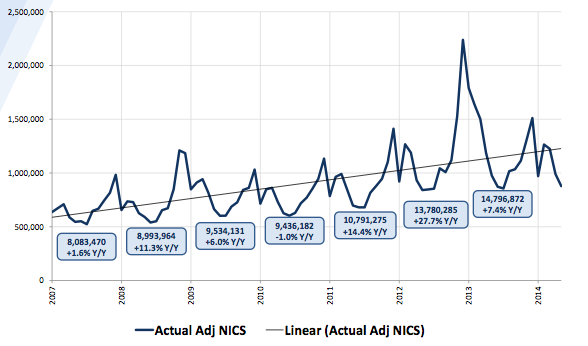Recall what I previously said about Remington trigger issues?
Remington 700 models have always had trigger issues, and it isn’t at all apparent that this recall is the same one that has caused Remington such problems in the past.
[ … ]
The most comprehensive and damning indictment of Remington and its trigger problems to date is still this article from Billings Gazette. See especially this evidence in the margins of the article, and this evidence, and this evidence, and the rest of the evidence.
The original article discusses “Senior Engineers” with Remington. I’m particularly partial to this work title, and I am a registered professional engineer. Are these folks registered as PEs with the state? If not, why? We are rightly concerned about roads, bridges and buildings, power plants and their proper design. Why not guns, and why shouldn’t these engineers be registered?
If they are, has the issue of Remington and the apparent internal evidence ever come to light with the state board of registration? Why would senior engineers ignore evidence of improper function of machines they designed and manufacture? Did these engineers consider it malfeasance to ignore such evidence, and if they didn’t see it or didn’t know the evidence existed, why not?
We have many more questions than we have answers. It has been this way for a very long time with Remington.
I’m an engineer. I simply won’t tolerate bad designs or professional malfeasance. And it looks like Remington is making good on their design.
The Remington Arms Co. has reached a nationwide settlement of claims that most of its Model 700 bolt-action hunting rifles have a defective trigger mechanism – a settlement likely to include the recall of millions of the popular firearm.
Attorneys for Remington and the plaintiffs in the class-action lawsuit against the company did not respond Monday to requests for comment on a “notice of settlement” filed last week in federal court in Missouri.
Yet Richard Barber, a Montana man who’s been saying for a dozen years that many of the Model 700 are defective and should be recalled, indicated Monday that a recall is part of the settlement.
“It does accomplish what I want to accomplish,” he told the Lee Newspapers State Bureau. “I guess it’s safe to say, it’s better late than never. …
“As a whole, (the settlement) represents the best interests of the public. It will save lives, it will save limbs.”
The lawsuit says more than 5 million Model 700 bolt-action rifles have been sold since 1962.
Barber’s 9-year-old son, Gus, was killed by a Model 700 rifle in a 2000 hunting accident in Montana. The family says the rifle fired when Barber’s wife, Barbara, released the safety as she prepared to unload the weapon. The bullet passed through a horse trailer and hit Gus, who was standing behind the trailer.
For more than a decade, Barber investigated the rifle’s trigger mechanism, compiled company internal documents and worked as a consultant on lawsuits from Model 700 owners whose rifle fired without the trigger being pulled.
He concluded that a defect in the Walker Fire Control on the trigger mechanism led to the incidents, sometimes causing the weapon to fire when the safety was released or the bolt was opened or closed.
The Walker Fire Control has been installed on Remington Model 700s and some other Remington rifle models since the 1940s. The company introduced a new fire-control mechanism, the X-Mark Pro, in 2006.
Barber, contacted by telephone Monday, declined to discuss details of the settlement, saying he doesn’t want to harm discussions still under way between the plaintiffs and the company.
The settlement notice, filed last Wednesday, is in a class-action lawsuit filed January 2013 in U.S. District Court in Missouri, by Ian Pollard, who purchased a Remington Model 700 rifle in 2000 in Belle, Mo.
Pollard’s lawsuit, filed against Remington and two affiliated companies, Sporting Goods Properties and E.I. DuPont, said his rifle had fired three times without him pulling the trigger, twice when the safety was released and once when the bolt was opened.
“Defendants have known since 1979 that at least 1 percent of all Model 700 rifles at that time would `trick,’ allowing them to fire unexpectedly without a trigger pull,” the suit said. “(Pollard) contends that this percentage is vastly understated and that all Model 700 rifles are subject to unexpected firing without a trigger pull.”
Pollard’s lawsuit asked the court to declare all Model 700 bolt-action rifles with a Walker Fire Control to be defective and to order Remington to recall those models. It also asked for compensatory and punitive damages against the company.
Last week’s notice said a settlement agreement will be submitted to U.S. District Court in Missouri by Oct. 30, after which the court will decide whether to approve it.
There are other steps to take for Remington to regain their lost loyalty, like relocating manufacturing South and out of union territory.




